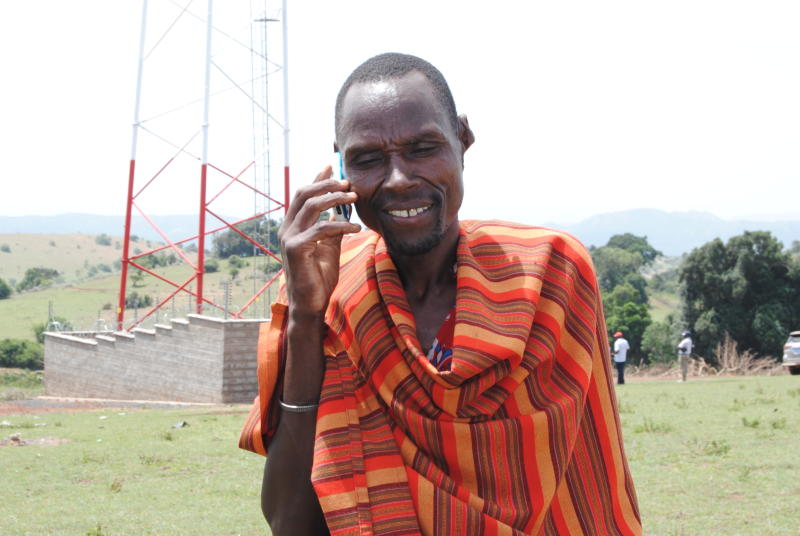
A resident of Narok West makes a call near a newly-constructed booster in the area. The Universal Service Fund injected Sh1.2 billion towards the network connectivity project. [Robert Kiplagat, Standard]
The Government appears to be reneging on its promise to bridge the digital divide across the country. It now wants private sector players to increasingly play such role.
The rollout of the Information and Communication Technology (ICT) infrastructure in the unserved and underserved areas was supposed to be undertaken by the Government, using funds collected from industry players.
The building of infrastructure in the ‘forgotten’ far flung areas using money from the Universal Service Fund (USF) – financed by telecommunication companies has however faced delays.
Telecoms contribute 0.5 per cent of their revenues to the fund.
To speed up network connection, the State has proposed giving players in the ICT industry incentives, and in some instances, making it mandatory for them to offer universal service.
This will help deepen access to technology in remote areas that risk being left behind as the rest of the country rides the digital revolution wave.
In the proposed policy, the State said it plans to incentivise network operators to invest in such areas. Incentives will entail the network service providers paying lower spectrum fees.
The Draft National Spectrum Policy makes it mandatory for some of the companies to deploy networks in the underserved areas as part of the licensing requirements.
“All wireless providers shall be required to participate in the provision of universal service to ensure the achievement of the Government’s development goals,” said the draft policy. It says deploying networks to underserved areas would also go hand in hand with incentives.
“The Government may consider discounting incentives, based on the provisions of universal service and access, through free-free spectrum resources in rural and unserved or underserved areas to encourage operators to deploy services in these areas.”
“The Government will also undertake specific actions or initiatives to foster the deployment of services in rural and unserved areas. This may include regional based service providers to offer last mile access to Kenyans via sharing agreements.”
The private sector players have in the past said some of the areas that lack coverage are not economically viable and hence the reason they haven’t invested there.
To ensure services are taken to such areas, the Government came up with the USF which collects levies from different ICT players, which are then used in building networks.
The Fund is housed by the Communications Authority, which contracts operators to construct the networks, which are basic, largely supporting voice and text messaging.
Implementation of USF projects has, however, been slow and could be among the reasons the Government is attempting to rope in private sector players to bridge the ICT divide.
“Other actions to promote rural coverage include provide incentives, while including possible trade-offs between reduced spectrum fees and carefully considered wider coverage obligations (and) provide non-discriminatory and timely access to public infrastructure, especially in rural areas,” reads the proposed policy in part.
The policy which is being subjected to public participation notes that the Government will simplify the approval process for new base stations to speed up deployments.
The State will also adopt competition policy, which supports investments in quality mobile networks and allow infrastructure sharing on commercial agreements that are market-led, based on each operator’s interest.
While, the local ICT sector has been eyeing advanced networks such as increasing coverage of 4G as well as possibility of introducing 5G, there are still numerous places without access to basic voice services.
Players have in the past warned that while faster technologies such as the 5G had potential to further grow the industry; it also stands to deepen the digital divide, leaving behind a chunk of the Kenyan population.
A past access gaps survey by CA showed that an estimated 2.66 million people cannot make phone calls without having to walk long distances. Even then, they are not guaranteed of quality service during calls.
CA has in the recent past been putting up network infrastructure in neglected regions.
Using the funds from the USF, the regulator has awarded contracts to telcos to build networks in some of these places that lack the network.
The USF was set up in 2009 but started operations in 2013 to provide financing to establish telecommunications services infrastructure in areas that are underserved.
Total annual contribution by the telcos stands at about Sh1.4 billion. As of March this year, the Universal Service Advisory Council has in the recent past said, the levy collected by USF stood at Sh10.6 billion.
Additionally, CA also gave Sh1 billion as seed capital. In its phase one, the fund disbursed Sh1.5 billion.
CA had awarded Safaricom and Telkom Kenya contracts to rollout mobile networks in 78 sub-locations.
The telcos were able to provide connection to 86 per cent of the targeted regions but faced delays partly due to implementation challenges according to CA report. The delays saw some project aspects stall as of last year.
Last year, CA awarded Sh836 million to Liquid Telecom (Sh218 million), Xtranet Communication (Sh318 million) and Commcarrier Satellite Services (Sh299 million) for broadband connectivity to 896 secondary schools across the country.
CA has begun phase two of the project that is expected to cover 123 sites in 20 counties with network infrastructure at Sh1.2 billion.

No comments:
Post a Comment